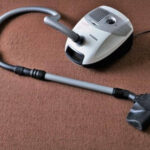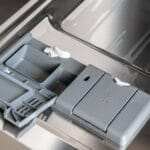Granite is one of the leading stone choices for kitchen and bathroom countertops. Besides luxurious and exquisite appearance, it offers additional benefits such as durability, heat resistance, scratch resistance, uniqueness and a wide variety of color patterns. On the other hand, it is delicate to care for. Accordingly, homeowners are left with no choice but to learn how to clean granite countertops with utmost caution to avoid short-term or permanent damage.
Also read how to clean quartz countertops.
What is Granite?
Granite is a natural rock with a composition comprising of unevenly distributed minerals. The three top minerals includes mica, feldspar and quartz. It is sourced from quarries and imitated through the creation of cheaper and less delicate stones.
Ideally, granite countertops are coated with a sealant that prevents water and other substances from penetrating into the rock. In most cases, the sealant is replaced after every 2-3 years but the period can change depending on factors such as quality, cleaning and countertop usage.
How to clean granite countertops.
Our guide on how to clean granite countertops begins with most basic cleaning steps and advances to the best measures for stain cleaning.
Tools and Supplies
- Microfiber cloth
- Dishwasher detergent
- Warm water
- Sponge
Instructions
Wipe the surface with a clean microfiber cloth
Begin by dusting the surface to remove excess dirt. Since granite countertops are smooth and shinny, they have the tendency to attract dirt easily. Besides, kitchen countertops accumulate a lot of dirt from food particles, spills and every other thing that comes into contact with them. It is best to use a dry microfiber cloth for this step because of its soft texture.
Clean gently
Combine warm water and dishwasher detergent to make a cleaning solution. Dip a sponge or microfiber cloth into the solution and wring it to remove excess water. Clean the countertop gently by making circular motions until all the dirt is removed. Rinse of the cloth with clean water and wipe the surface repeatedly until all the soapy residue is removed.
Dry the surface
Use a dry microfiber cloth to wipe off excess moisture from the countertop until it is completely dry. Pass your hand across the surface to ensure that it is completely smooth. If you feel a rough area, try to clean it again or inspect it properly for stains.
Disinfect the surface
Spray the countertop with rubbing alcohol and use a microfiber cloth to rub off excess moisture.
How to Remove Stains from Granite Countertops
Although granite countertops are not prone to staining, such incidences cannot be ruled out completely. Products such as cooking oil, coffee, fruit juices and spices can easily cause staining after spilling on kitchen counters. On the other hand, bathroom countertops are exposed to stains caused by body oils, massage products and nail polish.
Tools and Supplies
- Water
- Hydrogen peroxide
- Baking soda
- A bowl
- A spoon
- Microfiber cloth
- Razor
- Plastic wrap
Instructions
Spot Cleaning
Use a sharp razor to remove adhered substances. If dealing with something like paint or nail polish, let it dry and chip it off gently. As for grease and food substances, dab the area with a wet microfiber cloth so that it can soak the residue.
Stain treatment
Determine whether the stain is water or oil-based. Mix equal portions of hydrogen peroxide and baking soda to prepare a solution for treating water-based stains. If dealing with an oil-based stain, mix water and baking soda to form a paste. Apply the paste on the affected area, cover with a plastic wrap and let it sit for some few minutes. Use a microfiber cloth wipe off the paste and inspect if the stain has completely cleared. Repeat the process if necessary or consider investing in a commercial granite cleaner. If both of these approaches fail, follow the same procedure with poultice powder and liquid detergent paste.
DIY Granite Countertop Cleaner
Using dishwasher detergent and water is enough for cleaning granite but you can prepare a solution that will add more shine to your counters.
Tools and Supplies
- Spray bottle
- Rubbing alcohol
- Dishwasher soap
- water
- Lavender or peppermint essential oil
Instructions
Combine water and rubbing alcohol in a spray bottle in the ratio of 1:3. For example, use 1 ½ cups of water and ½ cup of rubbing alcohol for this recipe. Add a teaspoon of dishwasher soap to the mixture and 10 drops of essential oil. Shake well and use in the same way you would use dishwasher detergent and water to clean granite surfaces.
Can I use Bleach on Granite?
Based on the nature of its composition, granite cannot be subjected to any type of bleach, most commercial cleaners and many of the natural home cleaning remedies that are widely applicable to other surfaces.
When it comes to home cleaning remedies, it is important to avoid acidic solutions. Examples include vinegar, lemon and citrus based solutions. They affect the composition of the rock thereby ruining its appearance.
Secondly, granite should not be cleaned with solutions that contain ammonia.
Lastly, harsh all purpose cleaners are also bad for granite.
How to Care for Granite Countertops
The first and easiest way to care for granite countertops is ensuring that the surface is always sealed. Sealant prevents substances that can stain or damage the quality of granite from penetrating into the rock surface. Conduct a water test every few months to determine whether your countertops are properly sealed. Spay water on the countertop and let it sit for five minutes. If it gets absorbed into the stone, it is time to seek professional help.
Blot spills immediately. Spillage is a common problem especially for kitchen countertops. However, acting immediately prevents staining that results from overstayed spills. Follow up by cleaning the area with mild soap and water.





